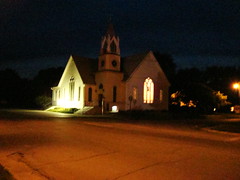I’m getting a real education as a result of reading Tony Jones’ latest book. If the book is any reflection of its author, then I’m pretty sure that this education is not what Tony intended.
Another Allegory
A young Danish man, Soren, grew up under the care of his parents, Michael and Anne (Ane). His father was a legalistic Christian, depressive, and sinner. Michael, Soren’s father, believed that the penalty for his sins would be passed on to his children. Soren’s father was so good at training him in Christian-legalism, that Soren would turn that legalism against the Danish Church.
Soren went to Theology School. His father was undoubtedly pleased. The young man’s fancy turned from Theology to Philosophy and Literature, Soren never really believed. He placed his father in the position of Christ saying, “he died for me in order that, if possible, I might still turn into something.” The father had insisted that Soren should become a Pastor. The boy felt obliged to fulfill his father’s wish.
The young man went on to far exceed his dead father’s expectations. Soren became regarded as one of the great minds of his time. He wrote many books and continues to influence many people to this day.
But Soren’s pastorate was not so successful. He became a farmer (gaard), sowing seeds of doubt around the church (kierke). His theology went askew. He reduced sin to “despair”. He taught that “doubt” is the springboard of Christian faith. This doubt-sowing shepherd taught that faith is founded on unbelief. Soren Kierkegaard continues to influence many Christian existentialists (religious doubters) to this day.
A few generations have sprung up from this Kierkegaardian pastorate of doubt. They represent the mixed multitude of the New Testament (postmodern) era. The religious doubters were keen on church membership. They didn’t think God was working unless they saw some movement. So, they started a Church Growth Movement. Church became something religious people just do. The doubters raised their children to be religious doubters too. The religious, doubting progeny left home to start their own churches. They said, “Each generation works out what it means to be Christian, so we can too.”
The New Kierkegaardians sought out teachers who were willing to teach clever-sounding things. Sayings like, “you can’t know the truth, and when you understand that, then you’ll know the truth” became music to their ears. They formed circles around their existentialist teachers and began deconstructing (tearing down) the Holy Bible. Jesus became a cheap cardboard cutout, who said; “The work of God is that ye doubt on him who he hath sent.”
Believe or doubt, what is the difference?
An Alternative Ending
Soren read the Holy Bible, and he recognized that it is the only reliable standard for Truth. He realized that his father lived for him, but Christ was the one who died on his behalf. The young man put Jesus Christ before all other things. He believed in Jesus as The Way, The Truth, and The Life (John 14:6). The young pastor knew that Jesus is the real sower (Mat. 13:3-9; 13:27) and the true seed is the Word of God (Mat 13:19-23). He led many people to Jesus through faithful preaching and exposition of the Bible. He taught the members of his flock to feed themselves with the Word, daily. And many churches were spared from the leaven of unbelief masquerading as genuine faith.
Bible-believing Christians were not duped by vain conversation. They recognized that the failures of men are not the failures of God.
What does that have to do with the Emergent church?
Tony’s “new Christianity” was birthed out of a merger between philosophy (liberalism, according to Tony) and church-growth work. Mr. Jones confesses that very plainly. Tony is not forthcoming about his Kierkegaardian theology, however. You’ll have to follow him closely to get it. Emergent sycophants refuse to see it, but those of us who read and listen carefully do.
Tony did a couple of interviews, for promotion of the book, where his theology of doubt comes out in spades.
One interview was with John Chisham. It’s an interview that apparently Tony doesn’t want people to see. When asked if he is born-again, Tony replied with a mocking response, at first. Then he spoke about his unbelief and tried to use Mark 9 and John 20 to justify his position as great faith.
Mr. Jones did another interview with Todd Wilken on KFUO’s Issues Etc radio program. We have a link to it. Tony becomes evasive and irritable when repeatedly asked biblical questions on church and pastoral responsibility.
Moreover, Tony speaks very plainly about the teachings of Brian McLaren. Jones doesn’t mind attaching the word “heresy” to Brian McLaren, because Tony thinks the word is meaningless. And don’t miss the fact that Brian McLaren made a name for himself with a book about people leaving churches to become New Age evangelists.
It's not an accident that Tony quotes Mark 9:24 between his preface and chapter one. These dubious Christian leaders want you to leaven faith with doubt.
Is this comparison unfair? I don’t think so.
UPDATE: 03/19/2008
The Lutheran Church Missouri Synod (LCMS) has suddenly canceled the Issues Etc radio show. Look here.
